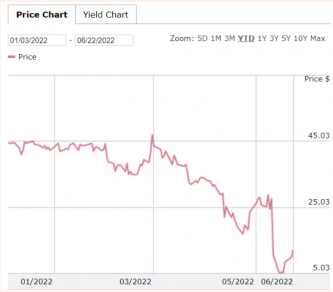Key points:
- The absolute priority rule means bonds get paid before equity
- Revlon's bonds trade at 12 cents on the dollar
- There's not going to be anything left for the equity
Revlon (NYSE: REV) stock has risen 400% and change since the declaration of Chapter 11 bankruptcy. This is not a logical response to the announcement, so, what is actually going on?
That Revlon stock is worth nothing can be shown by this:

There's a significant importance to this. In Chapter 11 – and even more so in Chapter 7 – the basic rule is that everyone higher up in precedence must be paid in full before the next lower claim gets anything. That's just how it works – senior debt gets paid first, junior second, unsecured third and equity gets anything left over.
Also Read: Best UK Stocks to Invest In
Revlon‘s total indebtedness is $3.5 billion and change, perhaps up over $4 billion. The enterprise value – ie, the business free of debt – is perhaps $3.2 billion. So, even if all creditors swapped their debt or equity then there's still an $800 million gap. This means there's really nothing left for equity or Revlon stockholders.
This is not the way that Revlon stock is trading of course. The word on the market is that this is not short positions closing out, rather, this is long buying by retail traders – Revlon's now a meme stock that is. OK, well, that has worked as with GameStop and we could include Hertz as an example perhaps.
Except there are considerable differences here. Hertz went bust because it couldn't meet the margin requirements on the bonds supporting the car fleet purchases. Used car prices slumped, they couldn't cover the security. While Hertz was in Chapter 11 used car prices then surged – sometimes to above new car prices, above even Hertz's own purchase prices. This meant all the bond holders could be paid and there was recovery for the equity. This isn't going to happen at Revlon – it's simply not true that stocks of lipstick are about to have a resurgence in value.
But what about the GameStop example? Meme stock status led to a price rise, then to the ability to issue new stock to refinance the company. This also isn't going to happen at Revlon. The reason being that Ron Perelman owns some 85% of the equity at Revlon. The free float is actually only some 7 million shares. Or, at current prices, perhaps some $56 million's worth. Even on generous assumptions that financing gap is that $800 million above. It's just not going to be possible to raise $800 million on that $56 million free float equity base. And if Ron Perelman were willing to refinance the company then he'd have done so already, before Chapter 11.
The problem here for Revlon stock is that absolute priority rule in Chapter 11. Everyone before the equity has to get paid off before there's anything left for the equity. If junior bonds are trading at 12 cents on the dollar then there's not enough to go around to pay even them. Therefore there's nothing left for the equity. We're also not going to see a substantial capital raise, as at GameStop or Hertz simply because the free float is too small.
Revlon stock is, objectively, worth nothing. Trading decisions therefore need to be made around time – when is it going to be true that Revlon stock is worth nothing?




